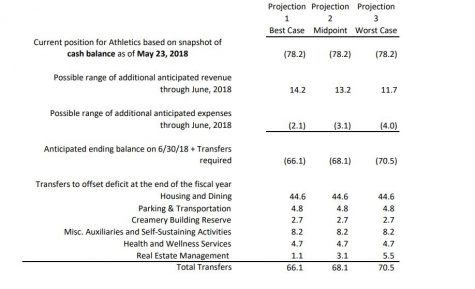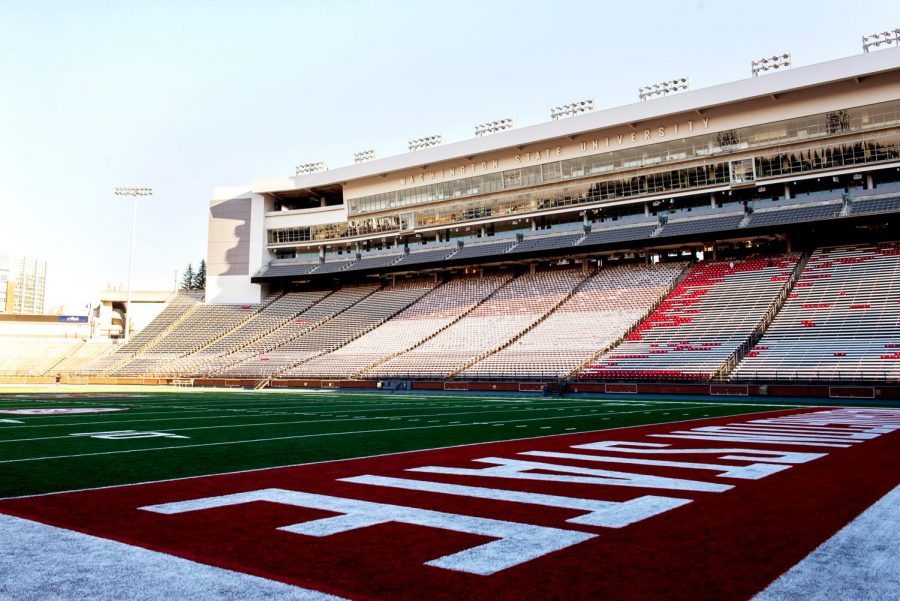Athletics budgets 27 percent increase in revenue, record ticket sales, higher fees
Plan anticipates annual debt to be erased by fiscal year 2023
DES MARKS | Daily Evergreen File
WSU Athletics will present a budget plan to address the deficit facing the department in front of the WSU Board of Regents June 7-8.
May 31, 2018
A new budget plan released by WSU Athletics on Thursday counts on student fees doubling by fiscal year 2022 to help address the more than $60 million deficit facing the department.
The plan, released ahead of next week’s WSU Board of Regents meeting where the group plans on addressing the deficit before the end of June as required by state law, said the department will erase the annual debt by fiscal year 2023 but the cumulative deficit will reach $84.9 million by then. The plan also said the department will have a surplus of $200,000 at the end of that fiscal year.
Joan King, WSU’s chief university budget officer, said after athletics achieves a balanced budget they plan on building up their reserves and repaying the university’s central reserves.
In the plan athletics will present to the Board of Regents next week, the department highlights four principles to “building a fiscally sound athletics program.” The first principle states, “the WSU community must solve the challenges.”
King said the department plans on implementing a mandatory student fee with approval from ASWSU. However, she said there is not currently a plan for how much the fee would charge each student per semester.
“We are anticipating that we will work with our students to implement a new fee that has not been determined of course,” she said. “Of course, we will have to work with our students before that could be implemented.”
The ASWSU Senate would have to pass a resolution to put the fee to a student vote, which if passed, would make the fee mandatory. In February, the ASWSU Senate struck down a proposal by Athletics to put a referendum on the ballot to make the $265 student sports pass mandatory.

This table inside the plan athletics will propose to the Regents shows estimates of the total deficit facing the department at the end of fiscal year 2018 and how much they will pull from other departments to not report a deficit in order to comply with state law.
“We are not here to make excuses,” Director of Athletics Pat Chun said in a news release. “We are here to move forward, take fiscal responsibility and provide a world-class student-athlete experience.”
The plans relies on increasing revenue by 27 percent by fiscal fear 2023 “while continuing to contain expenses,” according to a WSU news release. However, Chun did not name a specific area the department would look at to decrease expenditures.
In addition to ticket sales rising, Chun said during a news conference, the department plans on increasing fundraising donations to the Cougar Athletic Fund.
“My personal belief is that fundraising is going to be our biggest opportunity,” he said. “We’ve had significant increases in our Cougar Athletic Fund.”
Chun also said the school has looked at sponsors to address their budget woes.
“We’re looking at corporate sponsorship from a different lens right now,” he said. “We’ve been engaged with some companies with some significant deals.”
The plan also accounts for no increase in spending on food or facilities upkeep, with only minimal rises accounted for in recruiting, equipment, medical and insurance expenses, marketing and travel. The department also did not list any projected figures for future severance pay.
Athletics estimates ticket sales rising to $11.5 million by 2023, up $3 million from the estimated 2018 total. Sales rose by about $900,000 from 2015-2017.
Chun said the department will look mainly to a rise in attendance at men’s and women’s basketball for the increase in ticket sales.
“We have significant opportunity in both men’s basketball and women’s basketball,” he said.
Chun also said they project the football team remaining competitive and continuing to fill Martin Stadium to 90-95 percent of capacity in the coming years.
In order to comply with state law prohibiting public universities from reporting a deficit in any department, various departments will transfer money to athletics by the end of the fiscal year, including over $44 million from Housing and Dining. However, King said the money will go back to those groups at the beginning of the next fiscal year.
An internal audit in 2016 showed WSU Athletics had mismanaged ticket sales in 2016 by artificially inflating football attendance numbers, as well as showing then-Deputy Director of Athletics Mike Marlow had destroyed records at the end of the season showing who received free club-level tickets in Martin Stadium.
The department also plans on a $3.2 million rise in coaches compensation in the next five fiscal years, as well as a $1.2 million hike in athletic administrator compensation over the same period.
The WSU Board of Regents will consider the plan at their meeting June 7-8 in Woodinville.
This story will be updated as we gather more information.
[pdf-embedder url=”https://dailyevergreen.com/wp-content/uploads/2018/05/AI3-Athletics-Budget-5-24-18.pdf” title=”AI3 – Athletics Budget 5-24-18″]










